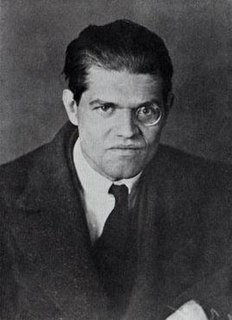A Quote by Raoul Hausmann
To be a photographer is to become aware of visible appearances and at the same time acquire from them an education in individual and common optical aperception. Why? Because every individual sees in his own way but see little more than images shaped by the cultural standards of a given period.
Related Quotes
We're not all the same. A common liberal refrain is that differences between individuals are statistically more significant than those between cultural, ethnic, and racial groups. I don't see why the fact of inter-individual differences would nullify inter-group variance. That's liberal logic for you.
Men of widely divergent views in our own country live in peace together because they share certain common aspirations which are more important than their differences.... The common responsibility of all Americans is to become effective, helpful participants in a way of life that blends and harmonizes the fiercely competitive demands of the individual and society.
In a sense technology is a tool of sort of individual choice, individual creativity, individual empowerment, individual access. My kids will never understand that it used to be kind of hard to access and find things, and know what the world knows and see what the world sees. Yet it becomes easier and easier every day.
Human beings look separate because you see them walking about separately. But then we are so made that we can see only the present moment. If we could see the past, then of course it would look different. For there was a time when every man was part of his mother, and (earlier still) part of his father as well, and when they were part of his grandparents. If you could see humanity spread out in time, as God sees it, it would look like one single growing thing--rather like a very complicated tree. Every individual would appear connected with every other.
If there be an order in which the human race has mastered its various kinds of knowledge, there will arise in every child an aptitude to acquire these kinds of knowledge in the same order. So that even were the order intrinsically indifferent, it would facilitate education to lead the individual mind through the steps traversed by the general mind. But the order is not intrinsically indifferent; and hence the fundamental reason why education should be a repetition of civilization in little.
The more he identifies with the dominant images of need, the less he understands his own life and his own desires. The spectacle’s estrangement from the acting subject is expressed by the fact that the individual’s gestures are no longer his own; they are the gestures of someone else who represents them to him.
Individuality in universality is the plan of creation. Each cell has its part in bringing about consciousness. Man is individual and at the same time universal. It is while realising our individual nature that we realise even our national and universal nature. Each is an infinite circle whose centre is everywhere and circumference nowhere. By practice one can feel universal Selfhood which is the essence of Hinduism. He who sees in every being his own Self is a Pandita (sage).
Let's say that history is what happened. The record of what happened is how each individual happens to see those events. They've already been ?ltered. When the historian or biographer takes over, history is no longer exactly what happened, because there has been a process of selection going on; it's impossible to write about anyone, any event, in any period of time, without in some way imposing, even unconsciously, your own standards, your own values.
If our planet has seen some eighty billion people it is difficult to suppose hat every individual has had his or her own repertory of gestures. Arithmetically, it is simply impossible. Without the slightest doubt, there are far fewer gestures in the world than there are individuals. That finding leads us to a shocking conclusion: a gesture is more individual than an individual. We could put it in the form of an aphorism: many people, few gestures.
Spiritual superiority only sees the individual. But alas, ordinarily we human beings are sensual and, therefore, as soon as it is a gathering, the impression changes - we see something abstract, the crowd, and we become different. But in the eyes of God, the infinite spirit, all the millions that have lived and now live do not make a crowd, He only sees each individual.








































